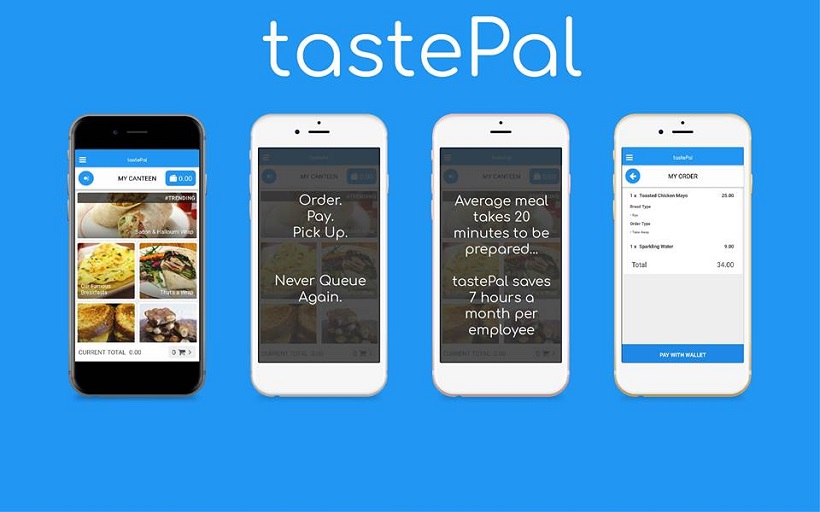South African startup tastePal is ready to scale into other sectors and countries after completing its proof of concept stage with six corporates.
Founded last year, tastePal aims to cut out lunchtime queues via its mobile app, which allows users to view the menu of their staff restaurant, order their meal, customise the order, make payment, and receive a notification when the meal is ready.
“tastePal has the goal of removing queues from the everyday life of office employees, and eventually also seeks to remove queues from schools and universities too,” founder and chief executive officer (CEO) Jordan Stephanou told Disrupt Africa.
The app is currently being used by six corporates, and has completed over 5,000 transactions. Stephanou said the proof of concept had shown tastePal saved each user an average of 25.3 minutes per order – around 8.4 hours per employee per month.
“We have received interest from all the major caterers in the country pending point of sale integration, and now we are focusing on integrating tastePal with InteliPOS so that we can scale across the catering market nationally,” Stephanou said.
Though currently only operating in the corporate catering market, tastePal plans to enter the school and university market in the near future. It also wants to expand across South Africa in these markets, and enter European markets in the next three years.
There is also a strong social angle to the startup.
“As soon as we started the business, we realized that we had an excellent opportunity to grow something and make an impact,” Stephanou said.
“I remembered when I was 16 on a community outreach to White River in Masoyi where I was helping administer home-based care to starving women and children. In that moment, on that outreach, as I looked into their eyes, I told myself that if I ever have the opportunity to help hungry people on a large scale, I have to grab it with both hands.”
As the team began to build out the tastePal model, it realised we had to make the social impact component integral to the way we it did business.
“That’s where we found FoodForward SA, who are doing excellent work using their network to redistribute edible surplus food to NGOs that predominantly feed starving women and children. We believe it makes sense to partner with an organization already doing excellent work in that space rather than “reinvent the wheel” with less effectiveness,” Stephanou said.
“So we decided to form a monthly revenue contribution, as well as build a feature into tastePal in which users can round up the cost of their transaction where the difference will get donated to FoodForward SA. We currently have the goal of contributing to at least 150,000 meals by the end of 2019, and we believe that as we scale we can exponentially increase those numbers to hopefully one day be key partners to FoodForward SA, and make a real dent in the food distribution problem in South Africa.”
However, the revenue growth necessary for this social impact will come from the corporate world, where Stephanou and his team realised there was a need for more efficient access to food in a workplace.
“In other aspects of life, we have the option of convenience with multiple delivery apps, but it is quite possible that the high pressure environment of an office needs convenience the most,” he said.
“We seek to solve this problem by providing the option for users to order their meal at the touch of a button, and be notified as soon as it is ready to simulate the experience that we can have in every other aspect of our lives.”
Competition comes from external delivery companies like Orderin, Appetite and UberEats, which specialise in restaurant food delivery. tastePal, however, focuses on meal ordering internally within an organisation.
“We see benefit in joining forces with successful point of sales and working together to provide the ultimate convenient solution for catering company and user alike,” Stephanou said.
The startup has been self-funded until now, but Stephanou said that may change as it seeks to scale internationally.
“We have really enjoyed the process of being “scrappy” and having to be as efficient as possible with our use of resources. We have learnt much more by being self-funded than if we have excess capital, and we believe it is best to pursue funding when it is not possible to self-fund to reach the goals we want to reach,” he said.
tastePal is a B2B business, in which the catering company is the paying client. The catering company pays an up-front fee per unit, and a monthly retainer fee per unit. The retainer fee is a tiered model: the more units the caterer commits to use tastePal in, the cheaper the app will be for them.
“The way we have structured the business model means that we will only see very exciting revenues and profits at scale, however the consistency of a monthly retainer allows us to plan our expenses and keep on top of our cash flow,” Stephanou said.
“Until now, we are breaking even and any profits are reinvested into the business for further product development. Once we have completed the integration with InteliPOS, we are looking to scale the business nationally, and we believe this will lead us to seeing exciting profits, as well as reaching our impact goal of contributing to at least 150,000 meals to FoodForward SA by the end of 2019.”


